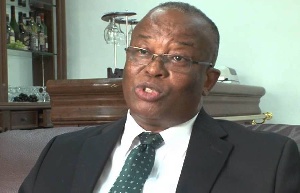The Vice Chancellor of the University of Health and Allied Sciences (UHAS), Prof. Fred Binka, has expressed concern over the current financial position of the new university, and appealed to the government to adopt urgent measures to address the problem.
The obviously worried, Prof. Binka explained that the university had admitted 500 new students for the 2013 and 2014 academic year, but as a result of infrastructure and financial difficulties, management had postponed reopening two times due to lack of accommodation for both students and lectures.
According to him, his administration, in its attempt to salvage the situation, had decided to renovate a private hostel in the Ho township to accommodate some of the students to enable the university start the new academic year. A six-unit classroom block meant for the university was also being converted into accommodation for some of the lectures.
The Vice Chancellor, however, noted that the situation where students and lectures would have to be transported from the hostel to campus would come at a cost to the university, but the funds were simply not there to handle the situation, and therefore, called for government intervention.
Prof. Binka, who made the appeal when the members of the Volta Caucus on Education in Parliament visited the university to acquaint themselves with development going on there, disclosed that initially, when the UHAS was established, the government made provision for only seven staff, but the current situation calls for an expansion of government’s support base to include other staff relevant for the smooth administration of the school.
The Vice Chancellor said recently, some Israeli contractors visited the Volta Regional Hospital with the aim of building a $700,000 seminar room for the hospital in Ho, as well as a $900,000 seminar room for that of the Hohoe Hospital as part of the upgrading of the regional hospital to a teaching hospital. He noted that though this was welcome news, it was still inadequate.
Prof. Binka pointed out that the management of the university was worried as to when the upgrading of the regional hospital would start, because the UHAS could not admit medical students unless the regional hospital had been upgraded to a teaching hospital, to help meet the practical needs of medical students.
He said there was a high demand for the courses being pursued at the university, and announced that key laboratories such as anatomy and physiology were crucial at any health training institution, noting that the University Council had approved of the building of these key laboratories, and land for the project acquired. According to him, lack of funds had made it impossible for the project to start.
The Vice Chancellor further explained that as a result of the non-availability of laboratories, students from the UHAS normally visit the Korle-Bu Teaching Hospital for practical work, and that in November 2013, the students would have to go for practical training at Korle-Bu, but the latter had given indication to the UHAS that it might not be possible, because the hospital would be very busy at that time.
Whilst being confronted with the above challenge, Prof. Binka said the university also needed to put up a big laboratory complex that would take care of practical training. The design for the two-story building laboratory had already been completed, and would cost GHc30 million upon completion.
They also need an auditorium that could accommodate 2,500 students, and an administration complex to cater for the needs of the university administrators, and the lecturers. He continued that the management of the Social Security and National Insurance Trust (SSNIT) had agreed to provide a 500-bed capacity hostel for the university on the permanent site at Sokode,which is ongoing, but work was progressing slowly.
Prof. Binka announced that there were plans to open the School of Pharmacy at the Hohoe campus, but all these called for adequate funding for the needed infrastructure for the smooth take-off the UHAS.
He was, however, happy about the quality of students who gained admission to the UHAS, noting that records showed that all the 10 regions had a sizable number of students at the university, with the lowest region having one student, which he mentioned as the Western Region.
The leader of the Volta Region Parliamentary Caucus on Education, Mr. Joseph Amenorwode, commended the staff and the management of UHAS, particularly the Vice Chancellor, Prof. Binka, for the display of professionalism, as well as high leadership skill demonstrated since the establishment of the UHAS.
Mr. Amenorwode assured the management of UHAS that the Parliamentary committee of the Volts Caucus would develop a quarterly meeting with the university authorities to enable the stakeholders to identify and find lasting solutions to difficulties confronting what he described as a new and promising university.
General News of Tuesday, 8 October 2013
Source: The Chronicle
No cash for NDC varsity
Entertainment
















